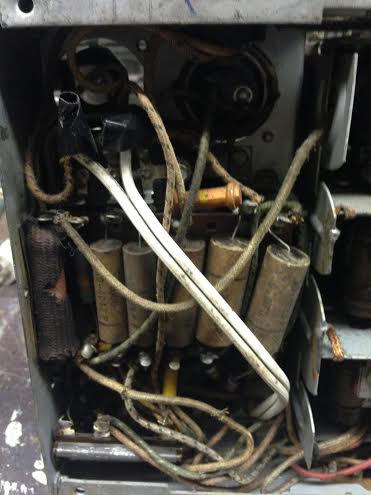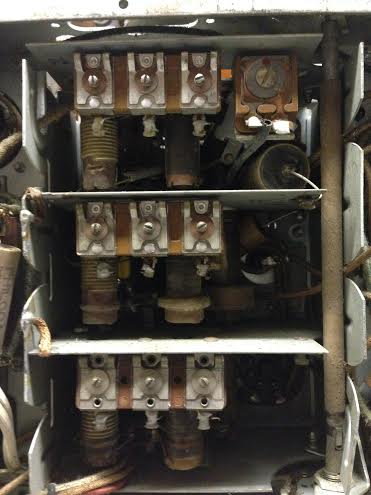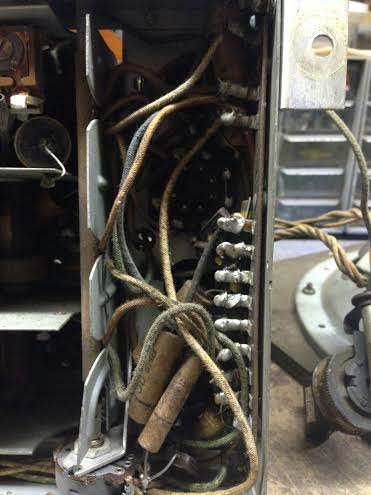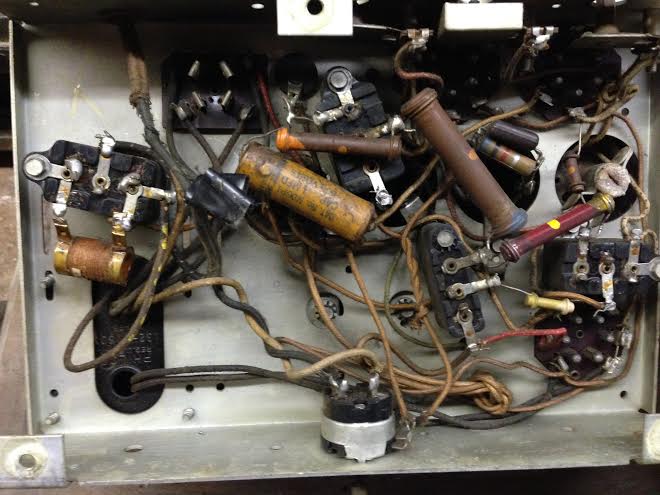Posts: 4,106
Threads: 310
Joined: Nov 2013
City: Kings Park NY
I purchased this decal set for my philco 37-640 floor model but the only one i see that is on any cabinet is the main philco decal. I cant understand why there are no knob decals??? I look them up and not one photo online shows decals on the front to let you know what positions are for the knobs. How would someone know what the knobs and positions were and were for without them? I guess it would be wrong to add them since it is not original... Are there decas i am missing? id still like to know what the positions are on the on off knob. this one has 3 settings 1.on, 2.?, 3. ?
???
Oh and one last thing. What about the switch knob in the middle bottom? what does that do? does it have to be in a certain position to get the radio to play? is that for the shadow meter?
Thanks
Kirk L
Posts: 13,776
Threads: 580
Joined: Sep 2005
City: Ferdinand
State, Province, Country: Indiana
Philco did not start using decals to identify the various knobs until the 1939 season. The exceptions to this are the high end 1937 and 1938 models: 37-690, 37-675, 37-116, 37-9, 37-10, 37-11; 38-690, 38-116, 38-1, 38-2, 38-3. Even these did not have a decal identifying the band switch.
How would you know? The original owners knew because they had the owner's manual. Those owner's manuals were usually tossed out by those same original owners, and few remain.
So how can you know now? Just ask someone here... 
The upper middle knob is, obviously, the tuning knob.
Lower three knobs, left to right: Off-On-Tone, Band Switch, Volume. The off-on-tone control is a multi-position switch instead of a variable control; this is how Philco designed the 37-640 and many other 1937 Philco models.
Band switch: Extreme counterclockwise - Standard Broadcast (AM); second position clockwise - Shortwave (lower band, the scale of which is just above the AM band on your dial); third position clockwise - Shortwave (upper band on your dial).
--
Ron Ramirez
Ferdinand IN
Posts: 4,106
Threads: 310
Joined: Nov 2013
City: Kings Park NY
ok thats good to know, one thing, the on off knob has a 4th position so it is off on tone and ?
what do these tone positions do? I cant seem to get any radio stations to come in, thanks for the prior info.
Kirk L
Posts: 13,776
Threads: 580
Joined: Sep 2005
City: Ferdinand
State, Province, Country: Indiana
I moved this thread to Philco Home Radios since it isn't specifically about a cabinet.
The four positions of the off-on-tone control are for four different levels of tone; the tone is supposed to get deeper as the control is switched clockwise.
As for no reception, two questions:
1. Have all paper and electrolytic capacitors been replaced?
2. Do you have a longwire antenna connected (to the far left of the four screws in back)? This can only be five feet or so for testing purposes, but should be much longer for normal use.
--
Ron Ramirez
Ferdinand IN
Posts: 736
Threads: 26
Joined: Jun 2013
City: Hayward, California
I think the last two positions are for tone... treble and bass positions. One has more bass than the other.
Posts: 4,106
Threads: 310
Joined: Nov 2013
City: Kings Park NY
Thanks for the info and I know what you are going to say, Dont turn on the radio until the capacitors are replaced. I have not learned to do this yet so i have not. I do have a 6' wire antenna connected but which screw? first is red, second is black, third is ground and 4 is unmarked.sorry to ask when you answered but i am no good with stage right or left....
As for the next questions: I need chassis training, I have been looking all over the getting started pages and found a few books for beginners but not sure which one is best for a complete novice.



Any suggestions or does anyone have one to sell me? Ill post it in wanted ads but i want to see what one to request.
1. Antique Radio Restoration Guide
2. Elements of Radio Servicing
3. The Radio Amateur's Handbook
4. Old Time Radios! Restoration and Repair
5. How to Repair Old-Time Radios
thanks all,
Kirk L
(This post was last modified: 12-12-2013, 08:03 AM by OldRestorer.)
Posts: 4,106
Threads: 310
Joined: Nov 2013
City: Kings Park NY
I also have this Philco 84 I am restoring the cabinet on. The radio works but not well the bottom looks like a lot of the wax caps were replaced. Should i work on this one first since it is easier looking?

Posts: 5,218
Threads: 275
Joined: Nov 2012
City: Wilsonville
State, Province, Country: OR
Kirk, I'm sure you'll get a variety of responses from different folks but here are some of the early learning steps I took.
Read "Old Time Radios: Restoration and Repair" by Joseph Carr (especially the safety section pgs. 238-245).
Read "The All American Five Radio" by Richard McWhorter
Read http://www.antiqueradio.org/begin.htm by Phil Nelson
Watch http://www.youtube.com/watch?v=d8wWw92HNZg by McWhorter
Watch some bandersentv episodes such as http://www.youtube.com/watch?v=qGhcvezH2...9ji2FUNYwg or his series on Model 60 restoration http://www.youtube.com/watch?v=xSpm5KfDWNo (Bob has a ton of great videos)
Continue learning by asking questions on the Phorum, reading more and working on simpler chassis first.
IMO your 84 would probably be easiest to start with. Here's a schematic to start with http://www.philcoradio.com/tech/images/84.jpg and here's a Service Bulletin at http://www.audiophool.com/Philco.html . Chuck Schwark may have additional info that would help for a nominal charge: http://www.philcorepairbench.com/schematics.htm
The black oblong boxes are bakelite capacitor blocks that need to have the caps replaced if they have not already been done. See: http://www.philcoradio.com/tech/blocks.htm and http://www.philcorepairbench.com/capbuild.htm for info on rebuilding/recapping them.
Others will surely chime in as well. Welcome to the Phorum!
Posts: 4,106
Threads: 310
Joined: Nov 2013
City: Kings Park NY
Ok,
that is some stuff to get and lots of reading ahead. I have looked for the books but amazon wanted like $1000.00 for one? I could not believe it. Ill have to keep my eye out unless i find someone here selling one on the for sale topics.
Thanks for the info and I will get started.
Kirk L
Posts: 5,218
Threads: 275
Joined: Nov 2012
City: Wilsonville
State, Province, Country: OR
Posts: 4,950
Threads: 54
Joined: Sep 2008
City: Sandwick, BC, CA
I would recommend "Elements of Radio Servicing" by Marcus and Levy, those turn up fairly regularly on fleabay. Another set of books to look out for is Basic Electronics put out by John F. Rider Publications back in the 1950s and 60s, those explain how most tube based circuitry works. Some really good how to videos to follow are the one on You Tube put up by joernone A.K.A Badrestorer, there is a recent series where he restores a really beat up Atwater Kent chassis.
Regards
Arran
(This post was last modified: 12-12-2013, 10:27 PM by Arran.)
Posts: 5,218
Threads: 275
Joined: Nov 2012
City: Wilsonville
State, Province, Country: OR
Posts: 4,106
Threads: 310
Joined: Nov 2013
City: Kings Park NY
I wish you had posted that earlier. I went on sleezebay and got the 6 volume basic electronics set but it is the wrong one...
Thanks for the links for the right ones. Once I finish some work I will get to reading.
Thanks all,
Kirk L
Users browsing this thread:
|
|
Recent Posts
|
|
Philco Model 38-7: what caps & resistors do fail typically?
|
| Hi all,
on vacation in Montreal, a friend of mine showed me a Philco Model 38-7 console radio from the 30ies. Mechan...Musaeum — 07:21 PM |
|
Part numbers to model cross
|
| I looked thru the documents and did not see one. Might have missed it though.Jim Dutridge — 07:16 PM |
|
Philco 42-345 Restoration/Repair
|
| Please tell me this was it, I replaced resistor 27 and it's playing on the broadcast band. I am afraid to change the ban...osanders0311 — 06:12 PM |
|
Philco 42-345 Restoration/Repair
|
| So far still no broadcast, I am posting pictures of #14 Oscillator and also a resistor #27 which connects to an XXL tube...osanders0311 — 04:02 PM |
|
Part numbers to model cross
|
| I believe there is that document, and I think we might have it in the Library.morzh — 03:29 PM |
|
Philco 42-345 Restoration/Repair
|
| Ok MrFixr55,
I have tried the DeoxIT D5 on the band switch and even though it has relieved the tension I felt when turn...osanders0311 — 11:11 AM |
|
Part numbers to model cross
|
| Is there a reference somewhere where you can punch in Philco part numbers and see what models those parts were used in?Jim Dutridge — 10:17 AM |
|
Philco 42-345 Restoration/Repair
|
| Hi OSanders,
Look carefully at the band switch. Turn it slowly and "wiggle" it around the desired band. ...MrFixr55 — 12:33 AM |
|
5U4 vs 5Z4 tubes
|
| I think that RCA and GE introduced metal tubes in the USA in 1936. I don't know if they were being made by RCA, GE or b...MrFixr55 — 11:20 PM |
|
Philco 42-345 Restoration/Repair
|
| Vlad95,
Thank you for the stringing guides and wow there are so manyosanders0311 — 06:01 PM |
|
Who's Online
|
There are currently 1284 online users. [Complete List]
» 3 Member(s) | 1281 Guest(s)
|
|
|

|
 
|



![[-] [-]](https://philcoradio.com/phorum/images/bootbb/collapse.png)


